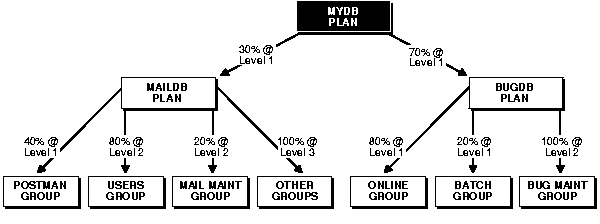Release 1 (9.0.1)
Part Number A89852-02
Home |
Book List |
Contents |
Index | Master Index | Feedback |
| Oracle9i Supplied PL/SQL Packages and Types Reference Release 1 (9.0.1) Part Number A89852-02 |
|
DBMS_RESOURCE_MANAGER, 16 of 19
This procedure lets you submit pending changes for the resource manager: It clears the pending area after validating and committing the changes (if valid).
DBMS_RESOURCE_MANAGER.SUBMIT_PENDING_AREA;
One of the advantages of plans is that they can refer to each other. The entries in a plan can either be consumer groups or subplans. For example, the following is also a set of valid CPU plan directives:
| Subplan/Group | CPU_Level 1 |
|---|---|
|
MAILDB Plan |
30% |
|
BUGDB Plan |
70% |
If these plan directives were in effect and there were an infinite number of runnable sessions in all consumer groups, then the MAILDB plan would be assigned 30% of the available CPU resources, while the BUGDB plan would be assigned 70% of the available CPU resources. Breaking this further down, sessions in the "Postman" consumer group would be run 12% (40% of 30%) of the time, while sessions in the "Online" consumer group would be run 56% (80% of 70%) of the time. The following diagram depicts this scenario:

Conceptually below the consumer groups are the active sessions. In other words, a session belongs to a resource consumer group, and this consumer group is used by a plan to determine allocation of processing resources.
A multi-plan (plan with one or more subplans) definition of CPU plan directives cannot be collapsed into a single plan with one set of plan directives, because each plan is its own entity. The CPU quanta that is allotted to a plan or subplan gets used only within that plan, unless that plan contains no consumer groups with active sessions. Therefore, in this example, if the Bug Maintenance Group did not use any of its quanta, then it would get recycled within that plan, thus going back to level 1 within the BUGDB PLAN. If the multi-plan definition in the above example got collapsed into a single plan with multiple consumer groups, then there would be no way to explicitly recycle the Bug Maintenance Group's unused quanta. It would have to be recycled globally, thus giving the mail sessions an opportunity to use it.
The resources for a database can be partitioned at a high level among multiple applications and then repartitioned within an application. If a given group within an application does not need all the resources it is assigned, then the resource is only repartitioned within the same application.
The following example uses the default plan and consumer group allocation methods:
BEGIN DBMS_RESOURCE_MANAGER.CREATE_PENDING_AREA(); DBMS_RESOURCE_MANAGER.CREATE_PLAN(PLAN => 'bugdb_plan', COMMENT => 'Resource plan/method for bug users sessions'); DBMS_RESOURCE_MANAGER.CREATE_PLAN(PLAN => 'maildb_plan', COMMENT => 'Resource plan/method for mail users sessions'); DBMS_RESOURCE_MANAGER.CREATE_PLAN(PLAN => 'mydb_plan', COMMENT => 'Resource plan/method for bug and mail users sessions'); DBMS_RESOURCE_MANAGER.CREATE_CONSUMER_GROUP(CONSUMER_GROUP => 'Bug_Online_group', COMMENT => 'Resource consumer group/method for online bug users sessions'); DBMS_RESOURCE_MANAGER.CREATE_CONSUMER_GROUP(CONSUMER_GROUP => 'Bug_Batch_group', COMMENT => 'Resource consumer group/method for bug users sessions who run batch jobs'); DBMS_RESOURCE_MANAGER.CREATE_CONSUMER_GROUP(CONSUMER_GROUP => 'Bug_Maintenance_group', COMMENT => 'Resource consumer group/method for users sessions who maintain the bug db'); DBMS_RESOURCE_MANAGER.CREATE_CONSUMER_GROUP(CONSUMER_GROUP => 'Mail_users_group', COMMENT => 'Resource consumer group/method for mail users sessions'); DBMS_RESOURCE_MANAGER.CREATE_CONSUMER_GROUP(CONSUMER_GROUP => 'Mail_Postman_group', COMMENT => 'Resource consumer group/method for mail postman'); DBMS_RESOURCE_MANAGER.CREATE_CONSUMER_GROUP(CONSUMER_GROUP => 'Mail_Maintenance_group', COMMENT => 'Resource consumer group/method for users sessions who maintain the mail db'); DBMS_RESOURCE_MANAGER.CREATE_PLAN_DIRECTIVE(PLAN => 'bugdb_plan', GROUP_OR_SUBPLAN => 'Bug_Online_group', COMMENT => 'online bug users sessions at level 1', CPU_P1 => 80, CPU_P2=> 0, PARALLEL_DEGREE_LIMIT_P1 => 8); DBMS_RESOURCE_MANAGER.CREATE_PLAN_DIRECTIVE(PLAN => 'bugdb_plan', GROUP_OR_SUBPLAN => 'Bug_Batch_group', COMMENT => 'batch bug users sessions at level 1', CPU_P1 => 20, CPU_P2 => 0, PARALLEL_DEGREE_LIMIT_P1 => 2); DBMS_RESOURCE_MANAGER.CREATE_PLAN_DIRECTIVE(PLAN => 'bugdb_plan', GROUP_OR_SUBPLAN => 'Bug_Maintenance_group', COMMENT => 'bug maintenance users sessions at level 2', CPU_P1 => 0, CPU_P2 => 100, PARALLEL_DEGREE_LIMIT_P1 => 3); DBMS_RESOURCE_MANAGER.CREATE_PLAN_DIRECTIVE(PLAN => 'bugdb_plan', GROUP_OR_SUBPLAN => 'OTHER_GROUPS', COMMENT => 'all other users sessions at level 3', CPU_P1 => 0, CPU_P2 => 0, CPU_P3 => 100); DBMS_RESOURCE_MANAGER.CREATE_PLAN_DIRECTIVE(PLAN => 'maildb_plan', GROUP_OR_SUBPLAN => 'Mail_Postman_group', COMMENT => 'mail postman at level 1', CPU_P1 => 40, CPU_P2 => 0, PARALLEL_DEGREE_LIMIT_P1 => 4); DBMS_RESOURCE_MANAGER.CREATE_PLAN_DIRECTIVE(PLAN => 'maildb_plan', GROUP_OR_SUBPLAN => 'Mail_users_group', COMMENT => 'mail users sessions at level 2', CPU_P1 => 0, CPU_P2 => 80, PARALLEL_DEGREE_LIMIT_P1 => 4); DBMS_RESOURCE_MANAGER.CREATE_PLAN_DIRECTIVE(PLAN => 'maildb_plan', GROUP_OR_SUBPLAN => 'Mail_Maintenance_group', COMMENT => 'mail maintenance users sessions at level 2', CPU_P1 => 0, CPU_P2 => 20, PARALLEL_DEGREE_LIMIT_P1 => 2); DBMS_RESOURCE_MANAGER.CREATE_PLAN_DIRECTIVE(PLAN => 'maildb_plan', GROUP_OR_SUBPLAN => 'OTHER_GROUPS', COMMENT => 'all other users sessions at level 3', CPU_P1 => 0, CPU_P2 => 0, CPU_P3 => 100); DBMS_RESOURCE_MANAGER.CREATE_PLAN_DIRECTIVE(PLAN => 'mydb_plan', GROUP_OR_SUBPLAN => 'maildb_plan', COMMENT=> 'all mail users sessions at level 1', CPU_P1 => 30); DBMS_RESOURCE_MANAGER.CREATE_PLAN_DIRECTIVE(PLAN => 'mydb_plan', GROUP_OR_SUBPLAN => 'bugdb_plan', COMMENT => 'all bug users sessions at level 1', CPU_P1 => 70); DBMS_RESOURCE_MANAGER.VALIDATE_PENDING_AREA(); DBMS_RESOURCE_MANAGER.SUBMIT_PENDING_AREA(); end;
The above call to VALIDATE_PENDING_AREA is optional, because the validation is implicitly done in SUBMIT_PENDING_AREA.
|
|
 Copyright © 1996-2001, Oracle Corporation. All Rights Reserved. |
|